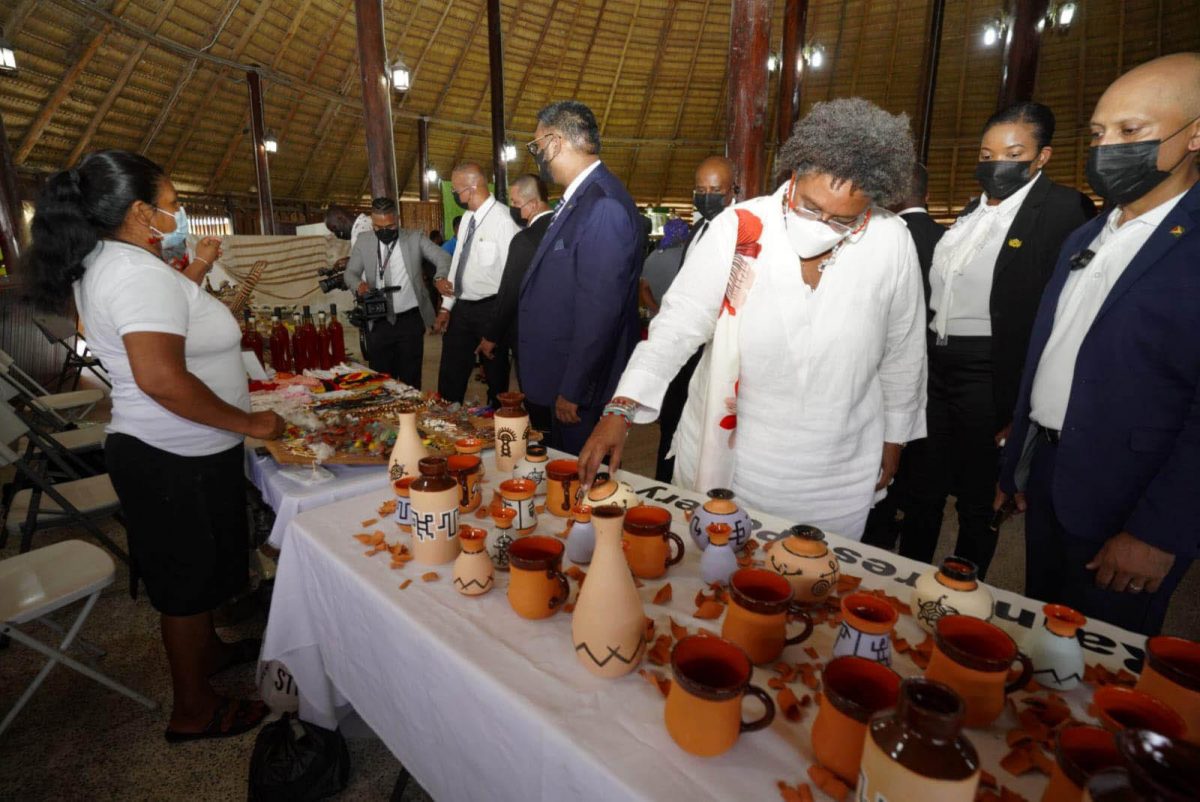Fresh from her recent visit to Guyana to attend Guyana’s high-profile international oil and gas conference, Barbados Prime Minister Mia Mottley earlier this week provided the media in Barbados with a fulsome briefing on her visit, asserting in her assessment of the visit that the discovery and subsequent recovery of oil offshore Guyana had now made the country a “global player” in the international oil & gas industry.
Significantly, however, the Barbados Prime Minister, who in January, won a second term in office, sweeping all thirty seats in the country’s Parliament, focussed by far the greater part of her assessment of the visit on its likely implications for relations between Guyana and Barbados going forward, as well as the expansion of that relationship to embrace another Caribbean Community (CARICOM) country and emerging oil producer, Suriname.
Summing up the “bilateral and tri-lateral discourses” in which she was involved during her stay here, Prime Minister Mottley said that those discourses had to do with ensuring “that we can continue to do the things that will boost our economy, and equally make life easier for our people.” Contextually, she named being able to ensure food security for CARICOM member countries as being among the more important issues that arose during the discussions. “If we can reduce the price of food, particularly healthy food, then we believe that we can add serious value,” she asserted during her media briefing in Barbados.
Beyond manageable food prices, Prime Minister Mottley told the Barbadian media that during her visit here, discussions with her Guyanese and Surinamese counterparts also centred on the issue of food production in the three countries. “Of course, Guyana and Suriname have much more land than we do and they all have access to fresh water. So we are talking about training, expanded production both in crop and livestock production and then using Barbados as a logistics hub in order to be able to supply, not just the Barbados market, but other markets, regionally and internationally.”
Mottley also told Barbadian journalists that during her visit to Guyana, “we were able to have discussions with their manufacturers and in fact I am happy to report that there will be a group of Guyanese manufacturers coming here early in April and looking at a range of products including prefab housing. We looked at the whole issue of access to timber and we have been discussing seriously, the question of combined training. There are some areas in which Guyana is training which will be what we need… in the area of welding and joinery etc.” On the other hand she said that Barbados had already begun the process of responding to Guyana’s need for trained hospitality workers. “They want 6,000, hospitality workers trained. We have already started the process of providing for that.”
Meanwhile, Prime Minister Mottley told the media on her arrival back home that the high-profile forum went beyond oil & gas. “It took a holistic look at renewable energy and most importantly, we were able to contextualize what we as developing nations have done.”
In her media presentation Prime Minister Mottley also touched briefly on the climate change considerations attached to the oil & gas industry, asserting that the 2050 ‘net zero’ timeline that is commonly attached to the oil & gas industry does not mean zero fossil fuels. “In truth and in fact it doesn’t. Even at the point of 2050 and net zero the world anticipates that there will at least be 20 to 25% use of fossil fuels. The question is who should be providing those fossil fuels? Is it only the existing suppliers [who] will be doing it or do you have emergent players like Guyana and others? Are we in a position to benefit from it? Those are some of the difficult and complex discussions that we put on the table that need to be resolved,” she told the Barbadian media.
Tourism and regional air travel were also among the issues discussed during Prime Minister Mottley’s visit here. She said that talks in Guyana also looked at “the whole issue of international transport, and particularly the holistics of logistics for the movement of cargo that continues to bedevil the Caribbean region and Suriname. There are some Surinamese players now that have invested in both air cargo and also maritime assets for cargo. And we are looking to see how we can continue to boost that,” she said.
Touching on the issue of trade Prime Minister Mottley said that “Barbados has some issues as it relates to sand Guyana and Suriname both want limestone,” a
circumstance which she sees as opportunities for intra-regional trade.
Talks in Guyana, according to the Barbados Prime Minister, also centred on reducing the cost of air travel between countries.
“We discussed the question of how we get the whole issue of reducing the cost of air travel between our countries? Because once people start moving they are going to find the opportunities that governments have not even thought about and they believe that therefore is also going to be one of the things you see significant progress on over the course of the next few weeks,” Prime Minister Mottley said.






